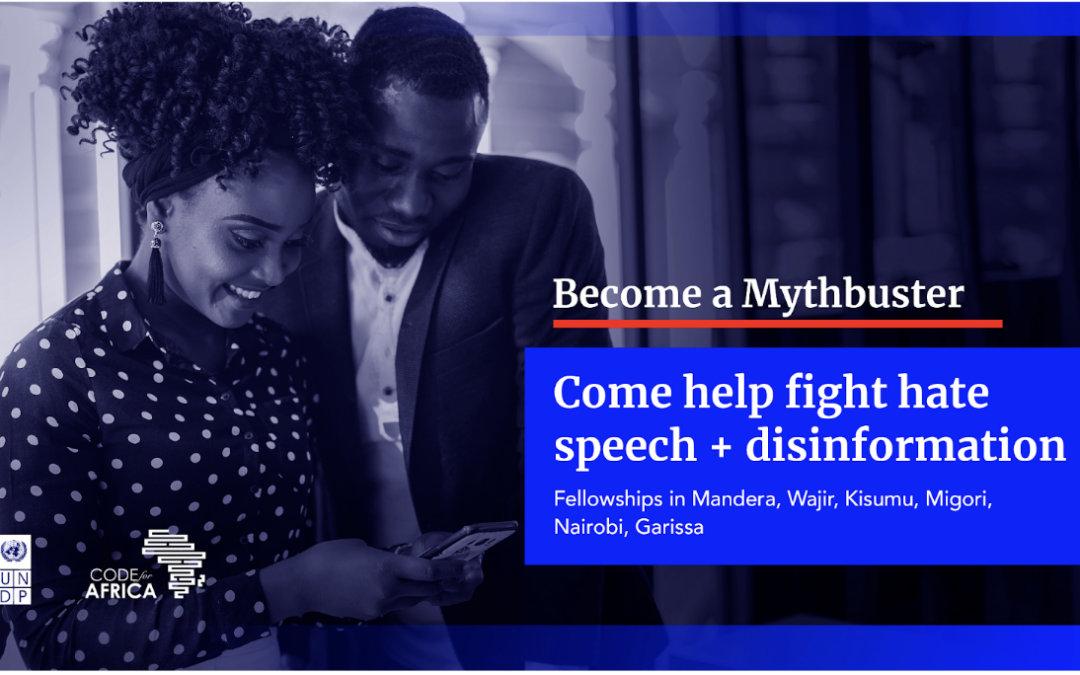Do you want to help counter misinformation, disinformation and hate speech in Kenya?
Code for Africa (CfA) is offering six mythbusters fellowships to communication ambassadors within the six target counties: Mandera, Wajir, Kisumu, Migori, Nairobi and Garissa. This will include identifying and engaging micro and nano influencers on social media and collaborating with them — within the guidelines set by platforms for political messaging initiatives — to share specific peacebuilding messages.
The part-time fellowships are part of the joint initiative between CfA and UNDP in Kenya to support the prevention of political violence and county-level ethnic and resource-driven conflicts both at national level in Kenya, and amongst vulnerable communities.
The successful candidates will work with CfA’s Knowledge team & iLAB forensic investigation team to identify and engage micro and nano influencers on social media and collaborating with them — within the guidelines set by platforms for political messaging initiatives — to share specific peacebuilding messages.
The Mythbusters fellows will use their visual storytelling skills, or large social media followings to help amplify the resulting debunks through compelling GIFs, animation or social video.
The fellows will be mentored by a team of international experts investigative analysts from the iLAB, UN peacebuilding specialists and social media engagement professionals.
The fellowship package will consist of :
- Networking: The fellows will be part of the Congress for Peace (COPP) influencer network, and will be invited to speak at network events or to present at major continental conferences.
- Stipend: Fellows will receive a competitive substantive monthly stipend depending on their influence as either macro or nano influencers and experience in similar previous projects.
Are You Eligible?
The Mythbuster Fellowships are intended to give mid-career pioneers a chance to use their skills to provide early warning alerts for civic watchdogs about online harmful toxic content in Mandera, Wajir, Kisumu, Migori, Nairobi and Garissa counties in Kenya. They will help lead local peacebuilding conversations with their social media audience in their communities that have networks of followers based on trust.
Therefore applicants must meet the following criteria:
- You must be a social media influencer with a substantive following/audience. Trusted grassroots messengers working as nano/macro-influencers will be prioritised.
- You must be non-partisan, without any link to political parties or government agencies or paramilitary organisations or state-affiliated media or other bodies that might create the perception of partisanship in the elections.
- You must commit to publish/broadcast your work on an appropriate public platform. CfA will assist with partnerships/syndication if appropriate.
- You must be fluent in English and, preferably, Kiswahili as well as local ethnic languages dominant in the counties they have influence in.
- You must have access to a reliable home laptop/computer with stable internet connectivity, to be able to participate in programme activities and online classes/mentorship.
- You must commit to sharing your new skills and insights within your organisation, followers and wider journalistic/research fraternity by demonstrating your projects and techniques to peers.
- You must commit to using your social media channels to amplify the activities and work produced during the fellowship.
- Be available for weekly one-hour virtual meetings.
The deadline for applications is 03 October 2023.
To apply, complete this form.
About the Partners:
- Code for Africa (CfA) is the continent’s largest network of digital democracy laboratories, with over 100 full-time data scientists, forensic researchers, technologists and digital storytellers working in support of investigative media and watchdog CSO partners in 21 African countries. CfA builds digital solutions that provide actionable information to citizens to encourage informed decisions, while also amplifying voices to strengthen civic engagement for improved public governance and evidence-driven accountability. CfA provides the technology/data support for Charter Africa. CfA will give fellows access to support from its openAFRICA data team, commons.AFRICA open source team, its source.AFRICA evidence research team, and a string of wider communities that CfA manages including the africanDRONE community of civic drone/mapping pioneers, the sensor.AFRICA community that uses remote sensors to monitor air/water/radiation and other environmental information, the PesaCheck fact-checking team that debunks misinformation, the iLAB forensic investigation team that tracks and exposes hate speech or other toxic content, the CivicSignal media monitoring and content analysis team, and the WanaData network of women data scientists/storytellers who liberate and amplify feminist data.
- Knowledge CfA’s Knowledge team, spearheads training, management and capacity-building initiatives for partner newsrooms, universities, and local communities in Africa. The Knowledge portfolio also includes CfA communities such as the WanaData women data science/storytelling network and the africanDRONE civic drone community, as well as the sensors.AFRICA sensor journalism initiative, with a network of more than 50+ newsrooms and university partners across Africa. The Knowledge team is also the custodian of other major CfA public infrastructure, such as the continent’s largest open data portal, open.AFRICA, and Africa’s largest census data portal, HURUmap.
- iLAB is Africa’s largest forensic analysis lab using artificial intelligence (AI) and machine learning (ML) tools to fight disinformation and hate speech across the continent. It has full-time data analysts and cybercrime investigators in eight countries (in Burkina Faso, Côte d’ivoire, Cameroon, Kenya, Nigeria, Senegal, South Africa, Sudan and Zimbabwe), who help expose digital campaigns designed to mislead the public in the run-up to elections and other democratic processes.
- The United Nations Development Program (UNDP) UNDP, is the primary United Nations entity for global development efforts and operates in 170 nations and regions with the aim of eliminating poverty and diminishing inequality. UNDP assists countries in formulating policies, enhancing leadership capabilities, fostering partnerships, strengthening institutions, and cultivating resilience to advance the Sustainable Development Goals. UNDP’s efforts are concentrated within three key areas: sustainable development, democratic governance and peace-building, and climate and disaster resilience.
